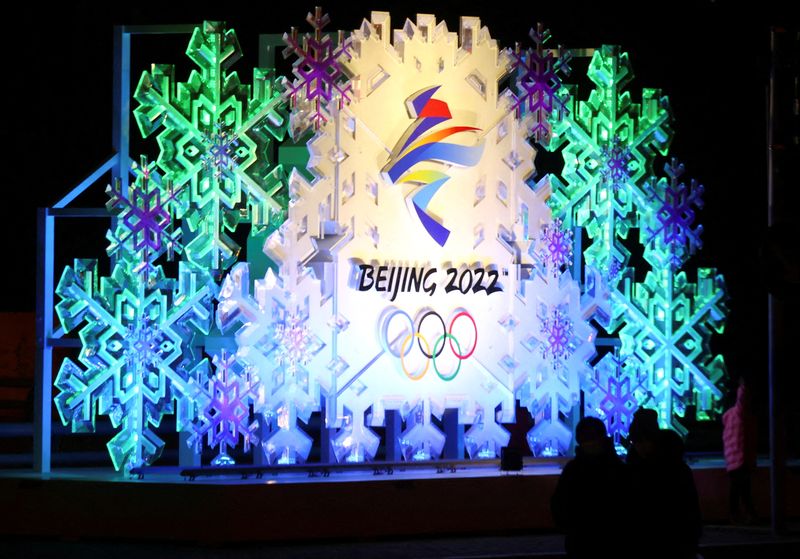By Sheila Dang
(Reuters) -Just a week before the opening ceremony of the 2022 Olympic Winter Games, U.S. television viewers can be forgiven for forgetting the date, or even that it is taking place in Beijing, China.
Unlike any Games in recent memory, the nearly 20 official international and national Olympic sponsors have laid low, ducking the press and viewers by holding back on the advertising blitz that typically kicks off months ahead the "let the Games begin" pronouncement.
By Wednesday, only two spots had launched, both of which focus on athletes with no mention of the host country, with which the United States is feuding on diplomatic and economic fronts.
Over the course of the Games, ad agency executives and advertisers told Reuters that viewers should expect ads to continue to downplay the location and ignore any hint of politics to avoid drawing attention to geopolitical conflict and the hot glare of the Chinese government.
Corporate sponsors and advertisers for the Beijing Olympics, which begin on Feb. 4 and run through Feb. 20, have come under fire for what human rights groups say is the enabling of China’s alleged abuses against Uyghurs and other ethnic minorities in the country. China denies those allegations.
Global Olympic sponsors were grilled by a bipartisan congressional panel in July, which accused the companies of putting profits ahead of accusations of genocide in China.
“The halo is tarnished,” said Mark DiMassimo, founder of New York-based ad agency DiMassimo Goldstein, which represents brands that are not official sponsors but plan to air commercials during the Olympics.
He said his clients decided to strip from their campaigns mentions of traditional Olympic themes - friendly competition, global unity and good sportsmanship - shortly after the Biden administration announced a diplomatic boycott of the Beijing Olympics last month.
Bridgestone Corp, an official sponsor of the International Olympic Committee, this month began airing a commercial featuring U.S. figure skater Nathan Chen, an Asian American, who advocates for authentic representation in skating, "no matter who you are or where you come from."
Delta Air Lines Inc (NYSE:DAL), the official airline of Team USA, is airing two commercials spotlighting skiers, snowboarders and figure skaters who defy gravity in their events.
German financial services firm Allianz (DE:ALVG) will have a film featuring winter athletes that will play on social media in the United States, a spokesperson said. Last year, Allianz filmed a short video about U.S. Paralympic athlete Matt Stutzman.
When Reuters asked the global and Team USA sponsors about marketing plans for the Olympics, only two responded, one of which declined to comment.
BIG DEPARTURE
This year’s response is a big departure from Olympics past, when advertisers crafted ads that embraced the spirit of the Games and honored the culture of the host country.
Microsoft Corp (NASDAQ:MSFT) last year aired a commercial for the Tokyo Olympics in which Japanese citizens showed famous parts of the city such as the Shibuya Crossing over a Teams call, sharing a piece of Tokyo for people who could not be there due to the pandemic.
A Coca-Cola (NYSE:KO) Co ad for the 2008 Beijing Summer Olympics featured animated birds stealing straws from Coke drinks to build a replica of the famed Bird’s Nest stadium. But that was then.
With the political controversy and the pandemic once again preventing spectators from traveling to the Games, viewers this time around can expect to see fewer mentions of the host city, said Jeremy Carey, managing director of ad agency Optimum Sports, a unit of Omnicom Media Group.
“It’s a challenge, quite frankly,” he said. “The connection isn’t as prevalent as it would normally be.”
Focusing on the athletes competing on the global stage is considered the safest strategy for brands, experts said.

“We’re trying to steer clear of the geopolitical implications around (the Olympics),” said Chris Brandt, chief marketing officer at Chipotle Mexican Grill Inc (NYSE:CMG). Chipotle will run ads during the Olympics promoting “real food for real athletes,” and feature the preferred orders of competitors like U.S. ice hockey player Hilary Knight.
Any attempt for a brand to associate themselves with the Beijing Olympics could backfire, DiMassimo said. “You just don’t know. You put (the commercial) on, and it might explode.”